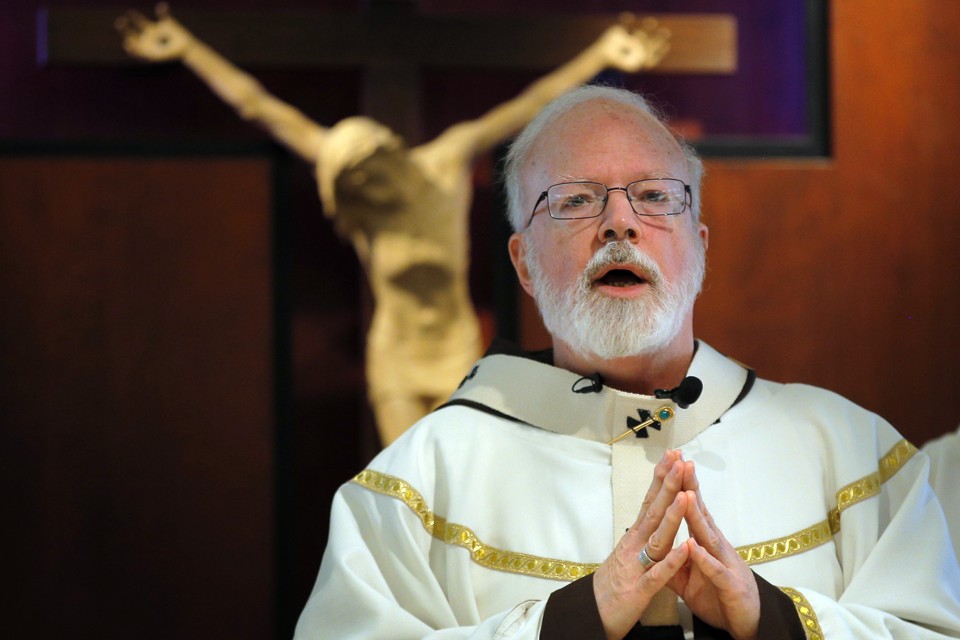The Archdiocese of Boston gave $850,000 to oppose an upcoming ballot measure—the second largest donation given to the campaign.

The Church’s donation increased the opposition effort’s funding by roughly 40 percent—only Sheldon Adelson, the Las Vegas billionaire who gave $1,000,000 to the opposition in early October, has cut a bigger check. The Knights of Columbus, another Catholic organization, has also given $150,000 to fight the initiative.
The donation is surprising, both for its politics and its size. Advocates of legal weed often frame their cause as a social-justice issue, pointing to the harms of the U.S. drug war and the way low-level drug arrests disproportionately affect men of color.
On many other issues, these progressive activists would likely find themselves aligned with Cardinal Sean O’Malley, who leads Boston’s archdiocese. During his 13 years in the city, O’Malley has redirected many of the Church’s resources toward caring for the poor.
He has led the development of policies around sex-abuse for the Church, and is part of Pope Francis’s inner circle; in 2013, the pontiff appointed him to a small council of advisers tasked with reforming Church governance.
Unlike many progressive reformers in the United States, though, O’Malley sees marijuana as a “dangerous drug that causes people to have problems with memory [and] ... reasoning.” He describes pot as a gateway drug to heroin and cocaine, and has argued that if Question 4 passes, Boston could “become a mecca, for people coming here as they do to Holland, Amsterdam, or … Colorado, looking for drugs.”
His suspicion of marijuana marks his distinctively Catholic approach to reforming communities: He believes legalization would be utterly destructive to communities in need, rather than their salvation.
But there’s a big difference between opposing a ballot measure and flooding the opposition with cash—$850,000 is a huge chunk of money, especially for an archdiocese that has closed parishes, shuttered schools, and dismantled the palatial archbishops’ residence due to financial strain over the last decade and a half.
Financially, things still aren’t great: The archdiocese lost $20.5 million in operating income between 2014 and 2015. And it has spent significant money on legal fees related to sex-abuse allegations in recent years—it came to new settlement agreements with seven alleged victims as recently as March.
In an email, the archdiocesan spokesman Terry Donilon wrote that the money came from a “central ministry” fund, not from donation baskets or funds that would normally go to parishes. The donation “reflects the fact that the archdiocese holds this matter as among the highest priorities,” he wrote. He listed off its social services, including food pantries, health clinics, counseling programs, addiction treatment, housing assistance, and support for immigrants.
“If Question 4 is approved,” he wrote, “all of these programs and the people we serve will be negatively impacted.” He said the archdiocese is particularly concerned about how the ballot measure will affect young people, including the 40,000 students who attend Catholic schools in the Boston area, even though the measure only allows recreational marijuana use for people over 21.
Boston could “become a mecca for people … looking for drugs.”
The Church presumably believes that if recreational marijuana is legal, people will consume more of it, undermining the Church’s efforts to build families and communities.
“They’re trying to ... alleviate poverty and improve family welfare,” said McGowan.
“This is gong to make it that much more difficult.” As the Knights of Columbus added in an emailed statement, “The focus of the state of Massachusetts should be on helping people, not giving them easier access to the false hope inherent in drug use, which does not solve problems but compounds them.”
O’Malley is not alone in opposing Question 4; he has collaborated with a number of other religious leaders on a public-information campaign against the ballot initiative.
Massachusetts Governor Charlie Baker, Boston Mayor Marty Walsh, and Massachusetts Attorney General Maura Healy wrote a Boston Globe op-ed opposing the measure in March, along with a number of other state officials and medical associations.
But unlike his political allies, the Boston cardinal has backed up his words with money—the new donation accounts for roughly 30 percent of the opposition’s funding.
While the archdiocese originally planned not to spend much money on the effort, “the more he thought about this and prayed about this, he thought this was the right thing to do because it directly impacts the people we’re trying to help,” Donilon told The Boston Globe.
No matter how substantial, the last-minute donation might be too late.
With Election Day roughly a week away, recent polls show Massachusetts voters firmly in favor of legalization.

No comments:
Post a Comment